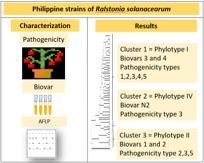当前位置:
X-MOL 学术
›
Plant Pathol.
›
论文详情
Our official English website, www.x-mol.net, welcomes your feedback! (Note: you will need to create a separate account there.)
Pathogenic and genetic variability of Ralstonia solanacearum strains from the Philippines
Plant Pathology ( IF 2.7 ) Pub Date : 2020-10-28 , DOI: 10.1111/ppa.13304 Joselito E. Villa 1 , Mitsuo Horita 2 , Mitsuro Hyakumachi 3 , Kenichi Tsuchiya 4
Plant Pathology ( IF 2.7 ) Pub Date : 2020-10-28 , DOI: 10.1111/ppa.13304 Joselito E. Villa 1 , Mitsuo Horita 2 , Mitsuro Hyakumachi 3 , Kenichi Tsuchiya 4
Affiliation

|
In the Philippines, bacterial wilt caused by Ralstonia solanacearum is one of the most important diseases affecting vegetables and banana. In this study, 89 strains of R. solanacearum isolated from various hosts were screened for their biovar, phylotype, pathogenicity, and genetic diversity. Foreign strains were included for comparison with these Philippine strains. Results of the biochemical and multiplex‐PCR tests divided the Philippine strains into five biovars (1, 2, 3, 4, and N2) and three phylotypes (I, II, and IV). Three potato strains belonged to biovar N2/phylotype IV. Pathogenicity tests divided the strains into five pathogenicity types based on their virulence in tomato, potato, eggplant, sweet pepper, and tobacco. Strains classified as biovar N2 were weakly pathogenic to potato (pathogenicity type III) and almost all strains isolated from banana were not pathogenic to the test plants except potato (pathogenicity type V). The results of AFLP analysis divided the strains into four clusters. Cluster 1 was composed of strains isolated from solanaceous crops, ginger (Zingiber officinale), and Morus sp. from the Philippines and other Asian countries. Cluster 2 grouped the potato strains (biovar N2) from the Philippines and Japan and blood disease bacterium strains from Indonesia. Cluster 3 contained the local and foreign strains isolated from potato (biovar 2) and banana (biovar 1). Cluster 4 consisted only of the tomato strain from the USA.
中文翻译:

菲律宾青枯菌的致病性和遗传变异
在菲律宾,青枯雷尔氏菌引起的细菌性枯萎是影响蔬菜和香蕉的最重要疾病之一。在这项研究中,89株ř。茄科筛选从各种宿主中分离得到的生物变种,系统型,致病性和遗传多样性。包括外来菌株以与这些菲律宾菌株进行比较。生化和多重PCR测试的结果将菲律宾菌株分为五个生物变种(1、2、3、4和N2)和三个系统型(I,II和IV)。三种马铃薯菌株属于生物变种N2 /叶型IV。病原性测试根据其在番茄,马铃薯,茄子,甜椒和烟草中的毒力,将菌株分为五种病原性类型。分类为biovar N2的菌株对马铃薯具有弱致病性(致病性III型),除马铃薯(致病性V型)之外,从香蕉中分离出的几乎所有菌株均对测试植物无致病性。AFLP分析的结果将菌株分为四个簇。Zingiber officinale)和桑属sp。来自菲律宾和其他亚洲国家。第2组将菲律宾和日本的马铃薯菌株(biovar N2)和印尼的血液病细菌菌株分组。第3组包含从马铃薯(biovar 2)和香蕉(biovar 1)中分离的本地和外源菌株。第4组仅包含来自美国的番茄菌株。
更新日期:2020-10-28
中文翻译:

菲律宾青枯菌的致病性和遗传变异
在菲律宾,青枯雷尔氏菌引起的细菌性枯萎是影响蔬菜和香蕉的最重要疾病之一。在这项研究中,89株ř。茄科筛选从各种宿主中分离得到的生物变种,系统型,致病性和遗传多样性。包括外来菌株以与这些菲律宾菌株进行比较。生化和多重PCR测试的结果将菲律宾菌株分为五个生物变种(1、2、3、4和N2)和三个系统型(I,II和IV)。三种马铃薯菌株属于生物变种N2 /叶型IV。病原性测试根据其在番茄,马铃薯,茄子,甜椒和烟草中的毒力,将菌株分为五种病原性类型。分类为biovar N2的菌株对马铃薯具有弱致病性(致病性III型),除马铃薯(致病性V型)之外,从香蕉中分离出的几乎所有菌株均对测试植物无致病性。AFLP分析的结果将菌株分为四个簇。Zingiber officinale)和桑属sp。来自菲律宾和其他亚洲国家。第2组将菲律宾和日本的马铃薯菌株(biovar N2)和印尼的血液病细菌菌株分组。第3组包含从马铃薯(biovar 2)和香蕉(biovar 1)中分离的本地和外源菌株。第4组仅包含来自美国的番茄菌株。


























 京公网安备 11010802027423号
京公网安备 11010802027423号